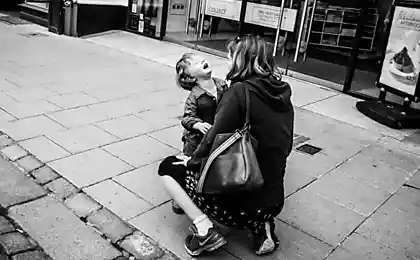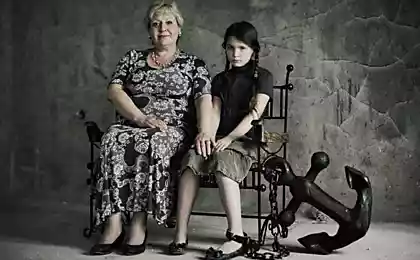912
Mothers and daughters: working on the bugs
Any woman has or had a mother. The relationship "mother-daughter" — the universal reason and the eternal topic of women talk. In accordance with our cultural ideals, mothers are supposed to be tender and loving — and her daughter too.
But an older woman raises a lot of emotions, not always positive when it comes to her mother. The relationship with the mother may be harmonious, and can be difficult or hostile. Most interesting is that they are almost never neutral. To understand them befalls all women in a particular period of their life, and maybe throughout life.
I propose to talk about the parent-child relationship, which in the course of life undergo inevitable changes. You need to know about all the important stages of development of relations in the pair "mother-daughter" to preserve the warm feelings that are needed by all women and not make serious mistakes.
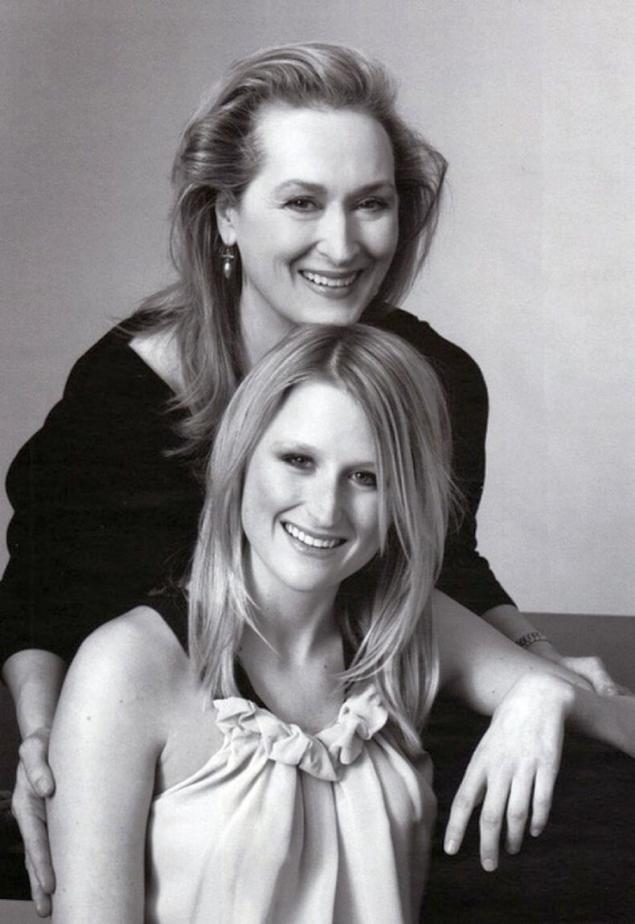
Unfortunately, there are cases when the mother of a close person becoming for the daughter of the enemy, while she believes that her daughter from her estranged.
Experts in the field of family relations have divided the relationship between a mother and daughter at three stages:
1. Mom give me a hug;
2. Mom let me go;
3. Mom leave me alone.
In fact, the relationship is much more versatile. Therefore, it is better to start with the most common errors in the system "mother-daughter". These errors it is better to avoid in the education of their child. The article is based on the text of the speech Ekaterina Eliseeva: Mom and daughter: when not everything went smoothly.
1. I'll make you something that was not herself.
Daughter in a symbolic sense, is the mother of the mirror, in which she sees her own reflection. Women subconsciously equate the daughter with him. Often mother it is difficult to understand where the border between her and the daughter.
Implicitly, and sometimes explicitly, the mother tells her daughter what she wants to see her than a daughter can and should be a daughter, growing up, consciously and unconsciously associates himself with the expectations of the mother. And then begins a fierce struggle for the similarities and differences, which affect both sides.
Considering the daughter of his "second I", "improved version" of a woman trying to educate her according to their ideas about what is best for his daughter, tries to compensate for all the shortcomings of their life. "Give her this isn't going to like me better."
Often the ideal selected something that didn't succeed the mother herself, what she wanted. So give the girl to the dance, mom dreamed of becoming a ballerina, to the music, she learned to play the piano, etc. however, many women do not pay attention to something to aspire, it is the child what abilities he possesses.
Between mother and daughter conflict. Mother is angry that the child does not appreciate what is done for him. And the girl wants to do what he likes and not what pleases the mother.
If the daughter is by nature obedient, if she blindly trusts a mother, she struggles to follow a life imposed by the scheme, "push yourself in a dream way," experiencing fear does not meet the ideal. In this situation, the conflict is expressed in the eternal anxiety of the daughter "to disappoint my mom", and then other important "mother" figures. She's trying to drive "split" into myself, and there is a hidden neurosis.
"Cage, I feel many of us, is a structure created by the projections of our parents and most importantly the mother who imposed on us these projections"
L. Leonard
The need to prove something to his mother, to achieve her recognition could be for women obsession.
I painted green sky and showed his mother.
She said that's probably okay.
Then I wrote another,
holding the brush in his mouth — look mum, no hands —
and she said, well, that could be of interest to someone
who knows how this was done; but not to me.
Chilling poem Cynthia MacDonald is called "Achievements": the heroine will play a concert Gounod Philharmonic orchestra, and the mother again say: well, good. And the heroine next time will play with the Boston Symphony, lying on his back, holding the clarinet legs — look mum, no hands. She'll make the almond souffle at first, and then with no hands, and so on.
You have understood everything: she would never be able to hear what it's about. Many of us also try: not with mother, with dad. The final is this:
So I sterilized my wrists,
made a brilliant amputation,
threw hands and went to his mother.
But before I managed to say: look, mom, no hands! —
she said I have a gift for you.
And insisted I tried on the baby blue gloves
just make sure the size is right.
No comment.
And how is mother?
"The search for the meaning of life in children and only children can be costly and she. He gives vampirism. Perhaps this search "surrogate" parental love, which she did not get in childhood, and children like a drug, it's a magic mirror, which will always say: you are the best mother.
One that is too strives to be the perfect mother, be sure to achieve this by suppressing the child that is not her ideal "reflection." If the child is a girl, the chances of the release below.
"The mirror" anyway, sooner or later will crack and there will be tension and even conflict. If not, the situation is even worse: you have all met couples where the mother and daughter were bound for life "the clinch", while the mother was stronger. The spectacle is not for the faint of heart: no girlfriends, men, anything that can "depressurize" the relationship of a merger, a symbiosis.
Full of hopelessness because of the love and respect we need some distance, some space. Yes, in the end, these two women each other just uninteresting — unlike the mother and daughter, setting a normal distance, which is what each other to talk, to eat something together, to laugh or to cry".
E. Mikhailova
Consider the child's wishes, not to make him unhappy.
2. You have me in your debt.
When the daughter becomes independent, the mother is often unable to deal with it. The loneliness, the inability to organize a personal life lead to the fact that the mother pulls the child maximum attention ("I'm not for you gave birth to..."). Daughter or becomes a captive of my mother's whims, or there is a conflict in which the mother leaves alone.
The horror of this situation is shown in the film "the Pianist" (1983) by Michael Haneke with Isabelle Huppert and Annie Girardot in the title roles and in the novel by Elfriede Jelinek, which shot the film.
Eric — forties professional pianist residing with the mother, not uncommon for an unmarried woman in our time.
"Eric came into the world not before he passed the difficult years of married life. As soon as his father passed the baton to his daughter, he promptly "left the scene".
Elfriede Jelinek
"Eric appeared, his father had disappeared, — it is impossible to Express a "replacement" father a child. This repression allows the mother to move another creature, completely subservient to her will, the father. Paternal involvement is reduced to the function of reproduction, and in order to ensure mother's favorite toy is her narcissism — a backup of a defective identity."
Eliacheff K., Anis N.
In such families daughter often devoid of exit from the sealed relationship with his mother, deprived of fresh air and freedom, chained to an aging mother.
In the film and therefore the novel presents a catalogue of perversions, which the daughter indicates that "something is rotten in the Danish Kingdom": masochism (psychological), which makes her every evening to go back to my mother and sit with her to watch TV instead of living their own lives, voyeurism, when Eric visits the pornographic places where secretly watching others do what she can't decide to do with a man's self-destruction when she cut his genitals with a razor blade, trying to remind that between her thighs something that appeals to life, and dying for lack of men, masochism (physical), not allowing Eric to respond adequately to the love confession of one of the students.
In her life there has never been space for relationships with men because of her power the shadow of his Mother. Any personal development Erica blocked incestuous relationship with her maternal prohibition blocked all possible ways to move from being girls to women.
Eternal lonely girl — this is a fee for the idea, "Mother, I will never leave you."
There is no dispute that mother, raising a child smarter and more experienced than him. But, it is necessary to stop in time. Many mothers do not see the emphasis that the girl was a grown woman who has the right to their own opinion. Mother forcing daughter my installation, which leads to conflicts, or seriously violates the privacy of his daughter. But each of us comes into this world with his own destiny.
The other scenario of development of relations one day the teenage daughter, formed a self-realized person, and realizing that the "lower classes can not, and the top — do not want", he decides to open protest.
To anything good it does not — girl, as a rule, does not know what she wants, just resists the pressure of his mother, but remained fully dependent on it. Subject is the daughter or rebels, in such a situation you cannot win.
We must not forget the right of their children to privacy.
3. Why do we need dad? He's the third wheel.
In the education of her daughter, the dad should also participate. Many moms forget about it completely "scrubbing" of the father into the background.
For the harmonious development of the girl he needed. And it should not "replace", and draw to communicate with my daughter. And as usually happens? As for the sad joke: "the family is all about dad. And who is the dad – mom decides".
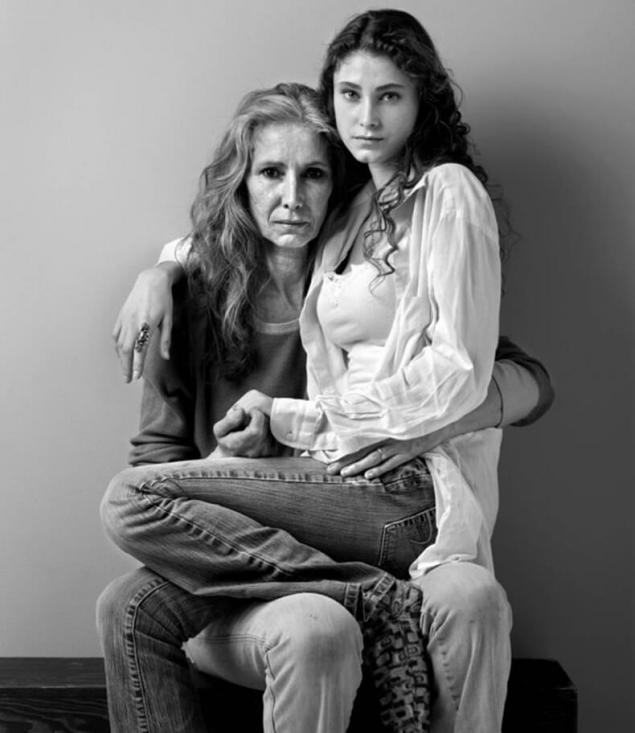
4. Your place is with me.
The next stage of development of the conflict — when the daughter is getting married or is preparing for it. In her life there are young people who are beginning to mean so much more for her than the parents, which often causes jealousy mother.
If my daughter decides to marry, the mother is often unable to accept that and insists on living together the whole clan. Meanwhile, the young family must live separately, have to grow up and gain experience. Living under the same roof is destructive for all family members, even if everything goes more or less well.
5. You are unable to choose a decent man.
The theme of mother-in-law and son-in-law has already become eternal. How many jokes there – not to retell. Sometimes in the struggle with his son, in the "declassification" of all vices, the mother destroys the family fortune of his daughter. Rarely in-law actually is a real bastard. As a rule, mother-in-law irritate most insignificant things.
Why?
The mother unconsciously compares the chosen daughter with his own ideal of a "real man", and it often prevents the development of relations between lovers. If her daughter marries a "foreign" mother of a person, the scheme of a "bright future" bursting at the seams. At this time relations between the two closest women can permanently be damaged. This question is to restrain myself not to become an enemy of his own daughter.
There is another situation, if the daughter obediently follows maternal attitudes and rejects not fit with her perspective suitors. When the girl turns 25 years old, the mother begins to put pressure on her, says it's time to get married, offering their own versions.
A daughter is a very painful experience such a conflict: on the one hand, they are internally protesting, on the other, still trust the mother. There is internal disorder — a favourable basis for psychosis. In this situation, can you advise the daughter to take one of the points of view or listen to mother and marry.
If successful – will be happy, if not – will become a philosopher or psychologist, variants are possible. Or reject the proposed option, because an external, direct conflict is easier than internal. If the daughter decided to reject the point of view of the mother, you will be able to defend their position and the conflict.
Mother and therefore puts pressure on her that feels vibrations. By the way, if the mother finds a suitor for his daughter, it's not always a bad thing — her life experiences and knowledge of people often help solve the problem, it is not always true problem daughter. Bad if for daughter's marriage is dictated only by the desire to escape from the custody of their parents.
First she achieves this goal, but when a child is born, the daughter becomes even more dependent on the parents: as a rule, a young family, at first, unable to provide for themselves, and the child need someone to sit on.
6. Give me grandchildren.
When you have children, many families are coming closer mother and daughter, because the daughter, having itself the same tests as the mother, begins to look differently at the world.
Attitude to the appearance of grandchildren, and his new status (grandmother) is the result of prior expectations or fears.
"This event can be perceived by them with cruelty, tenderness or humor, depending on their prior relationship to the approaching birth and the reaction to the message daughter about her pregnancy.
It is worth noting that the problem itself is to be a grandmother — not easy. The mother of an adult daughter can to some extent be willing to take or experience on this subject certain fears justified or not-too-plausible reasons, but never this situation is not her own choice.
The difficulty lies in the fact that grandma is going to experience with her daughter that she experienced when together with her own mother when she gave birth to a daughter. Now she has become the mother of his mother, who at the same time, remains her daughter, and which was formally under her or even, perhaps, subject still, and in addition, to recognize the child, both her and close, as this child is her daughter, and however distant and alien, as it is not her kid"
Eliacheff K., Anis N. "Mothers and daughters. The third wheel?".
Convergence often interfere with different points of view on the education of children.
"The transfer of the daughter's life experience, especially with the birth of her first child, posed a significant challenge and depends largely on the ability of the future grandmothers to share their knowledge and skills as yet unknown to the young mother, and the daughter's ability to perceive a mother's lessons or the ability to abandon them if a daughter feels the need.
Even if a woman is at least partially not accept the experience of her mother or grandmother, her reaction will not keep itself waiting long: at least, it will be necessary to confirm this gap and refusing to use their experience to continue"
Eliacheff K., Anis N. "Mothers and daughters. The third wheel?".
Many grandmothers consider their daughters a priori bad mothers, though, because they are "bad" daughters and literally excluded them from education. Thus, they sublimate their unfulfilled maternal feelings.
Then a situation arises where on the one hand, the daughter, of course, grateful for the help and the other wants to raise a child on their own, so inwardly tense, ready to reject any advice and suggestions to the mother, even the most reasonable, especially since they are sometimes accompanied by teachings like: "You have failed, the second error will not."
To maintain a good relationship, both have to constantly restrain himself, to strain to find a common language. All this is like riding a Bicycle: pedal go up and down, but still inextricably linked. You must understand that to educate children parents should be. Grandmother's need for care and love.
If alienation is growing and there is a possibility for a short period to disperse, to live separately, it is worth using. Then each of the parties fairly quickly begins to appreciate the advantages of living together — a daughter realizes that for a normal upbringing of the child's grandmother needed a mother misses her grandkids.
If I had to go to the gap, it is rather a loss than a win, because the result is aggression and there is alienation. Daughter sooner or later must understand that to establish a relationship with her mother required of her and her children. As for the child, communication with older relatives is useful and almost always carries a lot of positive emotions.
In addition, in the children's consciousness is made invisible, but very important job: the child learns to understand that in the world there are different points of view, learns how to find a compromise solution. If a child communicates only with his mother, then it will be difficult to adapt in society. He gets used to one single point, and when his performance suddenly broken, it is experienced as a tragedy.
For normal formation of the child, especially girls, a good relationship mother and grandmother are very important. If the mother constantly clashed with her grandmother, the daughter will build your relationship with your mother in the same way, and the situation ten or fifteen years will be repeated. Many of the causes of family tragedies lie in the conflict of the mother with the grandmother.
"In a kind of circular motion, starting from birth, the interaction between mother and daughter unfolds as a renewal and the renewal of the relationship, which had already taken place between the two women. And often many of the conflicts between mother and daughter passed from generation to generation"
Eliacheff K., Anis N. "Mothers and daughters. The third wheel?".
"Every woman extends backwards for his mother and forward into her daughter -- her life spans the generations, which carries with it a feeling of immortality."

Error daughter
1. I know life better than you.
Maybe the daughter can be smarter and more experienced mother. But don't forget Who raised You. Need to give my mom a tribute, not dub her opinion of earth. Listen to the advice mother's is definitely worth it. She has the experience.
Respect for the words of the mother – the key to a gentle and kind relationship. No need to vigorously resented the remarks and otherwise show that the opinion and experience of the mother You absolutely do not need it "trash", whose place in the garbage.
2. Leave me alone.
When the daughter becomes independent, acquires a family, children, her, and sometimes don't have time for mom. You should try not to put mother in the circle of his life. Regularly to see her, call (corny, but it took social advertising: "Call your parents, to many to recall), to visit, to go to the theater, cinema, shop.
May not always want to do it, but think about what Your children, too, once will leave You alone and will not visit. It's very hard. The mother at the time gave You a lot of time. Give her her due.
3. Your whole life is a total mess.
Adult daughter looks at the mother with his eyes and always says error. Sometimes it turns into a total criticism of the mother's life. In such a situation it is better to keep your opinions to yourself, and if You're concerned with lifestyle mom, to let her know this, of course, possible, though extremely cautious and not offensive.
4. You have to help me.
Another monstrous mistake daughters is that the personal life of the mother ends with the appearance of grandchildren. She could be from the life you have, but to sit on the bench? Adult daughter believes that the mother can be used as a lifesaver in all the vicissitudes of life. Mom should and grandchildren grow, and on the farm to help out and about my personal life to forget.
But your mother already raised You, she has the right to rest. Don't forget about it or offended if the mother refuses to sit with their grandchildren or going on vacation. She deserved it.
Over time, between mother and daughter is inevitable distancing. It is important to understand that this is not a gap, and the transition to a new quality, when the mother and daughter must become equal to each other on the warm and friendly relations.
Daughter is very important to try to be independent and not so dependent on the opinions of the mother, at the same time without leaving the mother. And the mother should take the daughter in the form of an adult woman to agree with her right to privacy, respect the opinion of their grown children.
However, to realize that the daughter grew up, mother's hard, the feeling of love between them often at this stage put to the test. After all, once he begins to contradict "light of my mirror," in which aging mother is reflected in inverse proportion to the flourishing of the child, which is well demonstrated by many tales and movies, particularly the last two versions of "Snow white".
And if a woman is not ready to relinquish the Royal crown of youth in favor of the successor, the negative aspect of the mother aktiviziruyutsya in her unconscious, taking possession of the whole personality.
Mother, of course, tries to realize himself Phoenix: let me burn, but the daughter will rise from the ashes. But, alas, the stepmother of the ridge it often takes over.
Then the mother tries to cheat time, keeping the daughter in the "heart" of their care, making her helpless and infantile as before pretended to be young ladies wanted their teenage daughters to output in the short – children's – dresses, after all, unforgivable for a young woman to have a grown daughter.
Or the mother trying to deflect the eyes of the people, to divert the attention of men, turning Cinderella into the wild "ungrateful" an ugly duckling. And the mother-witch can "drink the blood" of his daughter, interfering "mother Board" in the relationship with young people, etc.
This conflict between mother and daughter quite can be avoided if people are able to put yourself in the place of another, to understand and accept his position. Well, if we try to reach both sides — the mother and daughter. In this case, the understanding with the big share of probability will come. The main thing — to respect the other person.
If the mother refers to the child as an independent person, the relationship will be more harmonious. It is usually the mothers who are not "devote his life" to children, and successful are self-fulfilling in something else.
Then the mother perceives herself as a very lucky, happy woman. She has something to talk about with an adult daughter. And these relations bring them even more pleasure than raise.
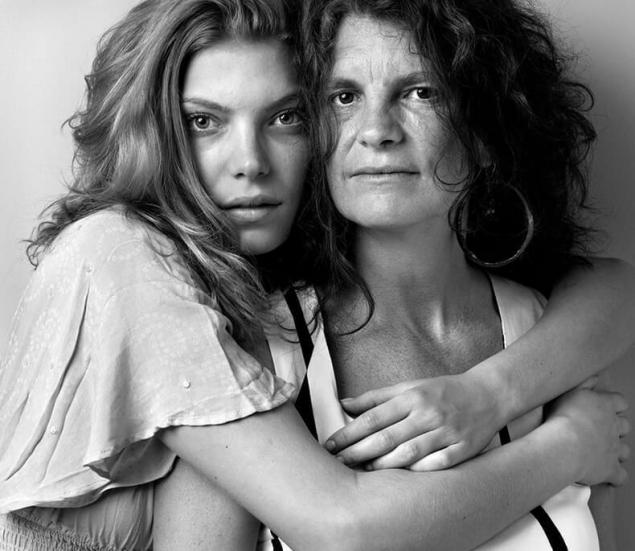
Learn to understand mothers. As adults, the daughters often make a complaint the mother and passed on her responsibility for their own shortcomings.
Therapy can help to recognize their own contribution to these problems and to unravel many of the complications between mother and daughter. If during therapy the woman develops an understanding (empathy) the fate of their own mother, she acquires a certain respect for continuity, continuity of women's experiences.
Desire and fear to become one with the mother, to be akin to it are inextricably linked with the desire to be different than the mother. If this difficult balance is felt and integrated, then the woman can become and will be both different and similar.
Try to understand the motives of your mother. It is important for you to know how impacted her life external circumstances. A mother who overly worried for his daughter when she comes into puberty, and tightly controls it, maybe at that age was a victim of sexual violence. She's just trying to protect her daughter from the suffering that she endured. And the daughter, meanwhile, thinks that her mother wants to ruin her life.
Learn the story of your mother's life. The more you know about your mother, the more you will see not seen you before, when you looked at her only as a mother. Try to remember what you know about her childhood.
For example, ask how old was your grandmother when your mother was born. As she lived? What were the economic, political and social conditions in the family when growing your mother?
Pay attention to your similarity. Ask yourself what you have in common with her mother — the values, fears, political views, types of friends, religious beliefs, favorite foods, sources of joy and sorrow, mannerisms, gestures, facial features, figure, sense of style etc...
Ask mom about the details of your birth and the first years of life.How was the pregnancy? How was the birth? What she felt for the first moment I saw you? What is it like to you when you were a kid? What is she afraid of? What gave her the hardest when she nursed you? Don't you think it is a bad or incompetent mother?
Let her know that you understand how hard it is to be a mother and would like to know how it all happened to her — from her point of view.
Think of the responsibility lay on the shoulders of your mother.Mothers usually bear the heavy burden of responsibility for the care and upbringing of children. Not only daily chores, which are themselves quite burdensome.
Mothers feel responsible for the psychological health of their children. Their first often blame, if their children are not all right.
Do not assume that your mother was invulnerable or all-powerful. The more you learn about the difficulties your mother when I raised you, the more forgiving you can be to her. In other words, think about what challenges it faces might affect her attitude toward your education.
Do you remember the days when she was too tired to play with you, or too irritable, or she lacked positive emotions? Maybe it was the time when she had especially hard? Yes, the first mirror of a person is the face of the mother. We learn to feel for the first time to show feelings with her and from her.
But if the mother does not receive support (if it is "killed" life), then is it any wonder that there is a mirror hung like a dead man's house, and she was unable to teach us trust and love to the world.
Put yourself in her place. No matter how you are like your mother, try to imagine what would have happened if you had lived the life which has fallen to her share. Perhaps you will come to the conclusion that the mother did everything that could be done in her circumstances".
To embrace your mother is to delve into the circumstances of her life, especially her education, her successes and failures outside the family circle – all that is human life. It's not easy – but for us it is primarily the Mother.
To accept it means to turn to face her, to see her in different roles, not just parent. Only opening it a person with interests, aspirations, dreams, unrelated to our lives, we can take some of her traits, even those that do not suit us.
To accept means to stop wishing it was different. So take it for what it is. The rejection of idealization allows to deal with reality.
But this process is not always associated with reunification: sometimes it happens that a person may take his mother, only if to see her very rarely or after her death, that is, when she can not him any more "harm".
But, to come to terms with her mother is very important. If this is not possible (for example, it is no longer with you or she doesn't want to listen to you) in reality, you can write her a letter to send is not accepted. It often happens that in the process of writing you can heal your inner pain, "forgive and release".
Another method of restoring my relationship with my mother is to use the ritual. Try to become her: to dress as he dressed, your mother, and imitating her habitual posture, and voice, in time to be her to feel what she felt, to say the most characteristic phrase and reflect on their meaning and cause.
Creating a positive parental image in the process of therapy can also heal the mother's injury. Working with dreams allows us to identify patterns inherited from our mothers, and opens us to the content of the feminine journey that is unique for each woman.
Drawing images, playing them, making masks, singing songs, engaging in dialogue with the mother images that appear in dreams and therapy, we somehow come into contact with the inner negative mother that you want to transform.
Most of us start out loyal attitude to parents after they are confronted with life's difficulties. And then comes the understanding: "That's what mom was feeling when he advised me this."
But not always. We often demand from mother more than she can give us: more love, more protection, more crazy.
The period of charges is often the first step towards acceptance. At this time, we think primarily about caused us grievances. When we are offended by a mother, we are her inner dialogue, and this means that mutual understanding is possible.
However, feeling the need to tell her mother about his offense (in real life), is to ask yourself: why would I want to do this? I hope that you will understand me better; I want her to feel guilty or felt the same pain as I?
You need to ask yourself honestly: will it improve the conversation our relationship? And then make a decision. Sometimes it's better to vent feelings on paper or talk about them to the psychologist.
But very often we just want attention and your accusations turn to a loving mother, hoping she would hear and hate us. We are offended by it, largely because I refuse to accept her as an ordinary person.
This feeling like a disappointment that we feel when we first realize that Santa Claus does not exist, that person will have traits that are alien to us. When we are not looking to re-educate your mother, we grow.
"In youth we do many things in order not to be like my mother, with age, we realize how much we like her. And when we can think about it without irritation, anger, and pride, to understand that for all the similarity we and she is independent personality, this moment means that we are willing to accept.
We are children until our parents are alive
Cultural-historical approach in family therapy
But this is possible only when we act consciously, not just trying to maintain an artificial peace. Over the period of the charges followed by the stage of revaluation, during which we realize the good and the bad, consider the nuances, we see mitigating circumstances.
Our memory is gradually "restore order" in our past: it softens painful memories, shading the light. One day we feel that we are relieved, we feel liberated and confident. The pain goes away, and we think of mother with sweetness"
"It's never too late to have a happy childhood". E. Mihajloviche
Author: Tina Ulasevich
Source: www.qui.help/blog/dochki-materi-rabota-nad-oshibkami
But an older woman raises a lot of emotions, not always positive when it comes to her mother. The relationship with the mother may be harmonious, and can be difficult or hostile. Most interesting is that they are almost never neutral. To understand them befalls all women in a particular period of their life, and maybe throughout life.
I propose to talk about the parent-child relationship, which in the course of life undergo inevitable changes. You need to know about all the important stages of development of relations in the pair "mother-daughter" to preserve the warm feelings that are needed by all women and not make serious mistakes.

Unfortunately, there are cases when the mother of a close person becoming for the daughter of the enemy, while she believes that her daughter from her estranged.
Experts in the field of family relations have divided the relationship between a mother and daughter at three stages:
1. Mom give me a hug;
2. Mom let me go;
3. Mom leave me alone.
In fact, the relationship is much more versatile. Therefore, it is better to start with the most common errors in the system "mother-daughter". These errors it is better to avoid in the education of their child. The article is based on the text of the speech Ekaterina Eliseeva: Mom and daughter: when not everything went smoothly.
1. I'll make you something that was not herself.
Daughter in a symbolic sense, is the mother of the mirror, in which she sees her own reflection. Women subconsciously equate the daughter with him. Often mother it is difficult to understand where the border between her and the daughter.
Implicitly, and sometimes explicitly, the mother tells her daughter what she wants to see her than a daughter can and should be a daughter, growing up, consciously and unconsciously associates himself with the expectations of the mother. And then begins a fierce struggle for the similarities and differences, which affect both sides.
Considering the daughter of his "second I", "improved version" of a woman trying to educate her according to their ideas about what is best for his daughter, tries to compensate for all the shortcomings of their life. "Give her this isn't going to like me better."
Often the ideal selected something that didn't succeed the mother herself, what she wanted. So give the girl to the dance, mom dreamed of becoming a ballerina, to the music, she learned to play the piano, etc. however, many women do not pay attention to something to aspire, it is the child what abilities he possesses.
Between mother and daughter conflict. Mother is angry that the child does not appreciate what is done for him. And the girl wants to do what he likes and not what pleases the mother.
If the daughter is by nature obedient, if she blindly trusts a mother, she struggles to follow a life imposed by the scheme, "push yourself in a dream way," experiencing fear does not meet the ideal. In this situation, the conflict is expressed in the eternal anxiety of the daughter "to disappoint my mom", and then other important "mother" figures. She's trying to drive "split" into myself, and there is a hidden neurosis.
"Cage, I feel many of us, is a structure created by the projections of our parents and most importantly the mother who imposed on us these projections"
L. Leonard
The need to prove something to his mother, to achieve her recognition could be for women obsession.
I painted green sky and showed his mother.
She said that's probably okay.
Then I wrote another,
holding the brush in his mouth — look mum, no hands —
and she said, well, that could be of interest to someone
who knows how this was done; but not to me.
Chilling poem Cynthia MacDonald is called "Achievements": the heroine will play a concert Gounod Philharmonic orchestra, and the mother again say: well, good. And the heroine next time will play with the Boston Symphony, lying on his back, holding the clarinet legs — look mum, no hands. She'll make the almond souffle at first, and then with no hands, and so on.
You have understood everything: she would never be able to hear what it's about. Many of us also try: not with mother, with dad. The final is this:
So I sterilized my wrists,
made a brilliant amputation,
threw hands and went to his mother.
But before I managed to say: look, mom, no hands! —
she said I have a gift for you.
And insisted I tried on the baby blue gloves
just make sure the size is right.
No comment.
And how is mother?
"The search for the meaning of life in children and only children can be costly and she. He gives vampirism. Perhaps this search "surrogate" parental love, which she did not get in childhood, and children like a drug, it's a magic mirror, which will always say: you are the best mother.
One that is too strives to be the perfect mother, be sure to achieve this by suppressing the child that is not her ideal "reflection." If the child is a girl, the chances of the release below.
"The mirror" anyway, sooner or later will crack and there will be tension and even conflict. If not, the situation is even worse: you have all met couples where the mother and daughter were bound for life "the clinch", while the mother was stronger. The spectacle is not for the faint of heart: no girlfriends, men, anything that can "depressurize" the relationship of a merger, a symbiosis.
Full of hopelessness because of the love and respect we need some distance, some space. Yes, in the end, these two women each other just uninteresting — unlike the mother and daughter, setting a normal distance, which is what each other to talk, to eat something together, to laugh or to cry".
E. Mikhailova
Consider the child's wishes, not to make him unhappy.
2. You have me in your debt.
When the daughter becomes independent, the mother is often unable to deal with it. The loneliness, the inability to organize a personal life lead to the fact that the mother pulls the child maximum attention ("I'm not for you gave birth to..."). Daughter or becomes a captive of my mother's whims, or there is a conflict in which the mother leaves alone.
The horror of this situation is shown in the film "the Pianist" (1983) by Michael Haneke with Isabelle Huppert and Annie Girardot in the title roles and in the novel by Elfriede Jelinek, which shot the film.
Eric — forties professional pianist residing with the mother, not uncommon for an unmarried woman in our time.
"Eric came into the world not before he passed the difficult years of married life. As soon as his father passed the baton to his daughter, he promptly "left the scene".
Elfriede Jelinek
"Eric appeared, his father had disappeared, — it is impossible to Express a "replacement" father a child. This repression allows the mother to move another creature, completely subservient to her will, the father. Paternal involvement is reduced to the function of reproduction, and in order to ensure mother's favorite toy is her narcissism — a backup of a defective identity."
Eliacheff K., Anis N.
In such families daughter often devoid of exit from the sealed relationship with his mother, deprived of fresh air and freedom, chained to an aging mother.
In the film and therefore the novel presents a catalogue of perversions, which the daughter indicates that "something is rotten in the Danish Kingdom": masochism (psychological), which makes her every evening to go back to my mother and sit with her to watch TV instead of living their own lives, voyeurism, when Eric visits the pornographic places where secretly watching others do what she can't decide to do with a man's self-destruction when she cut his genitals with a razor blade, trying to remind that between her thighs something that appeals to life, and dying for lack of men, masochism (physical), not allowing Eric to respond adequately to the love confession of one of the students.
In her life there has never been space for relationships with men because of her power the shadow of his Mother. Any personal development Erica blocked incestuous relationship with her maternal prohibition blocked all possible ways to move from being girls to women.
Eternal lonely girl — this is a fee for the idea, "Mother, I will never leave you."
There is no dispute that mother, raising a child smarter and more experienced than him. But, it is necessary to stop in time. Many mothers do not see the emphasis that the girl was a grown woman who has the right to their own opinion. Mother forcing daughter my installation, which leads to conflicts, or seriously violates the privacy of his daughter. But each of us comes into this world with his own destiny.
The other scenario of development of relations one day the teenage daughter, formed a self-realized person, and realizing that the "lower classes can not, and the top — do not want", he decides to open protest.
To anything good it does not — girl, as a rule, does not know what she wants, just resists the pressure of his mother, but remained fully dependent on it. Subject is the daughter or rebels, in such a situation you cannot win.
We must not forget the right of their children to privacy.
3. Why do we need dad? He's the third wheel.
In the education of her daughter, the dad should also participate. Many moms forget about it completely "scrubbing" of the father into the background.
For the harmonious development of the girl he needed. And it should not "replace", and draw to communicate with my daughter. And as usually happens? As for the sad joke: "the family is all about dad. And who is the dad – mom decides".

4. Your place is with me.
The next stage of development of the conflict — when the daughter is getting married or is preparing for it. In her life there are young people who are beginning to mean so much more for her than the parents, which often causes jealousy mother.
If my daughter decides to marry, the mother is often unable to accept that and insists on living together the whole clan. Meanwhile, the young family must live separately, have to grow up and gain experience. Living under the same roof is destructive for all family members, even if everything goes more or less well.
5. You are unable to choose a decent man.
The theme of mother-in-law and son-in-law has already become eternal. How many jokes there – not to retell. Sometimes in the struggle with his son, in the "declassification" of all vices, the mother destroys the family fortune of his daughter. Rarely in-law actually is a real bastard. As a rule, mother-in-law irritate most insignificant things.
Why?
The mother unconsciously compares the chosen daughter with his own ideal of a "real man", and it often prevents the development of relations between lovers. If her daughter marries a "foreign" mother of a person, the scheme of a "bright future" bursting at the seams. At this time relations between the two closest women can permanently be damaged. This question is to restrain myself not to become an enemy of his own daughter.
There is another situation, if the daughter obediently follows maternal attitudes and rejects not fit with her perspective suitors. When the girl turns 25 years old, the mother begins to put pressure on her, says it's time to get married, offering their own versions.
A daughter is a very painful experience such a conflict: on the one hand, they are internally protesting, on the other, still trust the mother. There is internal disorder — a favourable basis for psychosis. In this situation, can you advise the daughter to take one of the points of view or listen to mother and marry.
If successful – will be happy, if not – will become a philosopher or psychologist, variants are possible. Or reject the proposed option, because an external, direct conflict is easier than internal. If the daughter decided to reject the point of view of the mother, you will be able to defend their position and the conflict.
Mother and therefore puts pressure on her that feels vibrations. By the way, if the mother finds a suitor for his daughter, it's not always a bad thing — her life experiences and knowledge of people often help solve the problem, it is not always true problem daughter. Bad if for daughter's marriage is dictated only by the desire to escape from the custody of their parents.
First she achieves this goal, but when a child is born, the daughter becomes even more dependent on the parents: as a rule, a young family, at first, unable to provide for themselves, and the child need someone to sit on.
6. Give me grandchildren.
When you have children, many families are coming closer mother and daughter, because the daughter, having itself the same tests as the mother, begins to look differently at the world.
Attitude to the appearance of grandchildren, and his new status (grandmother) is the result of prior expectations or fears.
"This event can be perceived by them with cruelty, tenderness or humor, depending on their prior relationship to the approaching birth and the reaction to the message daughter about her pregnancy.
It is worth noting that the problem itself is to be a grandmother — not easy. The mother of an adult daughter can to some extent be willing to take or experience on this subject certain fears justified or not-too-plausible reasons, but never this situation is not her own choice.
The difficulty lies in the fact that grandma is going to experience with her daughter that she experienced when together with her own mother when she gave birth to a daughter. Now she has become the mother of his mother, who at the same time, remains her daughter, and which was formally under her or even, perhaps, subject still, and in addition, to recognize the child, both her and close, as this child is her daughter, and however distant and alien, as it is not her kid"
Eliacheff K., Anis N. "Mothers and daughters. The third wheel?".
Convergence often interfere with different points of view on the education of children.
"The transfer of the daughter's life experience, especially with the birth of her first child, posed a significant challenge and depends largely on the ability of the future grandmothers to share their knowledge and skills as yet unknown to the young mother, and the daughter's ability to perceive a mother's lessons or the ability to abandon them if a daughter feels the need.
Even if a woman is at least partially not accept the experience of her mother or grandmother, her reaction will not keep itself waiting long: at least, it will be necessary to confirm this gap and refusing to use their experience to continue"
Eliacheff K., Anis N. "Mothers and daughters. The third wheel?".
Many grandmothers consider their daughters a priori bad mothers, though, because they are "bad" daughters and literally excluded them from education. Thus, they sublimate their unfulfilled maternal feelings.
Then a situation arises where on the one hand, the daughter, of course, grateful for the help and the other wants to raise a child on their own, so inwardly tense, ready to reject any advice and suggestions to the mother, even the most reasonable, especially since they are sometimes accompanied by teachings like: "You have failed, the second error will not."
To maintain a good relationship, both have to constantly restrain himself, to strain to find a common language. All this is like riding a Bicycle: pedal go up and down, but still inextricably linked. You must understand that to educate children parents should be. Grandmother's need for care and love.
If alienation is growing and there is a possibility for a short period to disperse, to live separately, it is worth using. Then each of the parties fairly quickly begins to appreciate the advantages of living together — a daughter realizes that for a normal upbringing of the child's grandmother needed a mother misses her grandkids.
If I had to go to the gap, it is rather a loss than a win, because the result is aggression and there is alienation. Daughter sooner or later must understand that to establish a relationship with her mother required of her and her children. As for the child, communication with older relatives is useful and almost always carries a lot of positive emotions.
In addition, in the children's consciousness is made invisible, but very important job: the child learns to understand that in the world there are different points of view, learns how to find a compromise solution. If a child communicates only with his mother, then it will be difficult to adapt in society. He gets used to one single point, and when his performance suddenly broken, it is experienced as a tragedy.
For normal formation of the child, especially girls, a good relationship mother and grandmother are very important. If the mother constantly clashed with her grandmother, the daughter will build your relationship with your mother in the same way, and the situation ten or fifteen years will be repeated. Many of the causes of family tragedies lie in the conflict of the mother with the grandmother.
"In a kind of circular motion, starting from birth, the interaction between mother and daughter unfolds as a renewal and the renewal of the relationship, which had already taken place between the two women. And often many of the conflicts between mother and daughter passed from generation to generation"
Eliacheff K., Anis N. "Mothers and daughters. The third wheel?".
"Every woman extends backwards for his mother and forward into her daughter -- her life spans the generations, which carries with it a feeling of immortality."

Error daughter
1. I know life better than you.
Maybe the daughter can be smarter and more experienced mother. But don't forget Who raised You. Need to give my mom a tribute, not dub her opinion of earth. Listen to the advice mother's is definitely worth it. She has the experience.
Respect for the words of the mother – the key to a gentle and kind relationship. No need to vigorously resented the remarks and otherwise show that the opinion and experience of the mother You absolutely do not need it "trash", whose place in the garbage.
2. Leave me alone.
When the daughter becomes independent, acquires a family, children, her, and sometimes don't have time for mom. You should try not to put mother in the circle of his life. Regularly to see her, call (corny, but it took social advertising: "Call your parents, to many to recall), to visit, to go to the theater, cinema, shop.
May not always want to do it, but think about what Your children, too, once will leave You alone and will not visit. It's very hard. The mother at the time gave You a lot of time. Give her her due.
3. Your whole life is a total mess.
Adult daughter looks at the mother with his eyes and always says error. Sometimes it turns into a total criticism of the mother's life. In such a situation it is better to keep your opinions to yourself, and if You're concerned with lifestyle mom, to let her know this, of course, possible, though extremely cautious and not offensive.
4. You have to help me.
Another monstrous mistake daughters is that the personal life of the mother ends with the appearance of grandchildren. She could be from the life you have, but to sit on the bench? Adult daughter believes that the mother can be used as a lifesaver in all the vicissitudes of life. Mom should and grandchildren grow, and on the farm to help out and about my personal life to forget.
But your mother already raised You, she has the right to rest. Don't forget about it or offended if the mother refuses to sit with their grandchildren or going on vacation. She deserved it.
Over time, between mother and daughter is inevitable distancing. It is important to understand that this is not a gap, and the transition to a new quality, when the mother and daughter must become equal to each other on the warm and friendly relations.
Daughter is very important to try to be independent and not so dependent on the opinions of the mother, at the same time without leaving the mother. And the mother should take the daughter in the form of an adult woman to agree with her right to privacy, respect the opinion of their grown children.
However, to realize that the daughter grew up, mother's hard, the feeling of love between them often at this stage put to the test. After all, once he begins to contradict "light of my mirror," in which aging mother is reflected in inverse proportion to the flourishing of the child, which is well demonstrated by many tales and movies, particularly the last two versions of "Snow white".
And if a woman is not ready to relinquish the Royal crown of youth in favor of the successor, the negative aspect of the mother aktiviziruyutsya in her unconscious, taking possession of the whole personality.
Mother, of course, tries to realize himself Phoenix: let me burn, but the daughter will rise from the ashes. But, alas, the stepmother of the ridge it often takes over.
Then the mother tries to cheat time, keeping the daughter in the "heart" of their care, making her helpless and infantile as before pretended to be young ladies wanted their teenage daughters to output in the short – children's – dresses, after all, unforgivable for a young woman to have a grown daughter.
Or the mother trying to deflect the eyes of the people, to divert the attention of men, turning Cinderella into the wild "ungrateful" an ugly duckling. And the mother-witch can "drink the blood" of his daughter, interfering "mother Board" in the relationship with young people, etc.
This conflict between mother and daughter quite can be avoided if people are able to put yourself in the place of another, to understand and accept his position. Well, if we try to reach both sides — the mother and daughter. In this case, the understanding with the big share of probability will come. The main thing — to respect the other person.
If the mother refers to the child as an independent person, the relationship will be more harmonious. It is usually the mothers who are not "devote his life" to children, and successful are self-fulfilling in something else.
Then the mother perceives herself as a very lucky, happy woman. She has something to talk about with an adult daughter. And these relations bring them even more pleasure than raise.

Learn to understand mothers. As adults, the daughters often make a complaint the mother and passed on her responsibility for their own shortcomings.
Therapy can help to recognize their own contribution to these problems and to unravel many of the complications between mother and daughter. If during therapy the woman develops an understanding (empathy) the fate of their own mother, she acquires a certain respect for continuity, continuity of women's experiences.
Desire and fear to become one with the mother, to be akin to it are inextricably linked with the desire to be different than the mother. If this difficult balance is felt and integrated, then the woman can become and will be both different and similar.
Try to understand the motives of your mother. It is important for you to know how impacted her life external circumstances. A mother who overly worried for his daughter when she comes into puberty, and tightly controls it, maybe at that age was a victim of sexual violence. She's just trying to protect her daughter from the suffering that she endured. And the daughter, meanwhile, thinks that her mother wants to ruin her life.
Learn the story of your mother's life. The more you know about your mother, the more you will see not seen you before, when you looked at her only as a mother. Try to remember what you know about her childhood.
For example, ask how old was your grandmother when your mother was born. As she lived? What were the economic, political and social conditions in the family when growing your mother?
Pay attention to your similarity. Ask yourself what you have in common with her mother — the values, fears, political views, types of friends, religious beliefs, favorite foods, sources of joy and sorrow, mannerisms, gestures, facial features, figure, sense of style etc...
Ask mom about the details of your birth and the first years of life.How was the pregnancy? How was the birth? What she felt for the first moment I saw you? What is it like to you when you were a kid? What is she afraid of? What gave her the hardest when she nursed you? Don't you think it is a bad or incompetent mother?
Let her know that you understand how hard it is to be a mother and would like to know how it all happened to her — from her point of view.
Think of the responsibility lay on the shoulders of your mother.Mothers usually bear the heavy burden of responsibility for the care and upbringing of children. Not only daily chores, which are themselves quite burdensome.
Mothers feel responsible for the psychological health of their children. Their first often blame, if their children are not all right.
Do not assume that your mother was invulnerable or all-powerful. The more you learn about the difficulties your mother when I raised you, the more forgiving you can be to her. In other words, think about what challenges it faces might affect her attitude toward your education.
Do you remember the days when she was too tired to play with you, or too irritable, or she lacked positive emotions? Maybe it was the time when she had especially hard? Yes, the first mirror of a person is the face of the mother. We learn to feel for the first time to show feelings with her and from her.
But if the mother does not receive support (if it is "killed" life), then is it any wonder that there is a mirror hung like a dead man's house, and she was unable to teach us trust and love to the world.
Put yourself in her place. No matter how you are like your mother, try to imagine what would have happened if you had lived the life which has fallen to her share. Perhaps you will come to the conclusion that the mother did everything that could be done in her circumstances".
To embrace your mother is to delve into the circumstances of her life, especially her education, her successes and failures outside the family circle – all that is human life. It's not easy – but for us it is primarily the Mother.
To accept it means to turn to face her, to see her in different roles, not just parent. Only opening it a person with interests, aspirations, dreams, unrelated to our lives, we can take some of her traits, even those that do not suit us.
To accept means to stop wishing it was different. So take it for what it is. The rejection of idealization allows to deal with reality.
But this process is not always associated with reunification: sometimes it happens that a person may take his mother, only if to see her very rarely or after her death, that is, when she can not him any more "harm".
But, to come to terms with her mother is very important. If this is not possible (for example, it is no longer with you or she doesn't want to listen to you) in reality, you can write her a letter to send is not accepted. It often happens that in the process of writing you can heal your inner pain, "forgive and release".
Another method of restoring my relationship with my mother is to use the ritual. Try to become her: to dress as he dressed, your mother, and imitating her habitual posture, and voice, in time to be her to feel what she felt, to say the most characteristic phrase and reflect on their meaning and cause.
Creating a positive parental image in the process of therapy can also heal the mother's injury. Working with dreams allows us to identify patterns inherited from our mothers, and opens us to the content of the feminine journey that is unique for each woman.
Drawing images, playing them, making masks, singing songs, engaging in dialogue with the mother images that appear in dreams and therapy, we somehow come into contact with the inner negative mother that you want to transform.
Most of us start out loyal attitude to parents after they are confronted with life's difficulties. And then comes the understanding: "That's what mom was feeling when he advised me this."
But not always. We often demand from mother more than she can give us: more love, more protection, more crazy.
The period of charges is often the first step towards acceptance. At this time, we think primarily about caused us grievances. When we are offended by a mother, we are her inner dialogue, and this means that mutual understanding is possible.
However, feeling the need to tell her mother about his offense (in real life), is to ask yourself: why would I want to do this? I hope that you will understand me better; I want her to feel guilty or felt the same pain as I?
You need to ask yourself honestly: will it improve the conversation our relationship? And then make a decision. Sometimes it's better to vent feelings on paper or talk about them to the psychologist.
But very often we just want attention and your accusations turn to a loving mother, hoping she would hear and hate us. We are offended by it, largely because I refuse to accept her as an ordinary person.
This feeling like a disappointment that we feel when we first realize that Santa Claus does not exist, that person will have traits that are alien to us. When we are not looking to re-educate your mother, we grow.
"In youth we do many things in order not to be like my mother, with age, we realize how much we like her. And when we can think about it without irritation, anger, and pride, to understand that for all the similarity we and she is independent personality, this moment means that we are willing to accept.
We are children until our parents are alive
Cultural-historical approach in family therapy
But this is possible only when we act consciously, not just trying to maintain an artificial peace. Over the period of the charges followed by the stage of revaluation, during which we realize the good and the bad, consider the nuances, we see mitigating circumstances.
Our memory is gradually "restore order" in our past: it softens painful memories, shading the light. One day we feel that we are relieved, we feel liberated and confident. The pain goes away, and we think of mother with sweetness"
"It's never too late to have a happy childhood". E. Mihajloviche
Author: Tina Ulasevich
Source: www.qui.help/blog/dochki-materi-rabota-nad-oshibkami
Hardwood floors for home how to transform it into a masterpiece of design
How to grow figs at home on the windowsill















